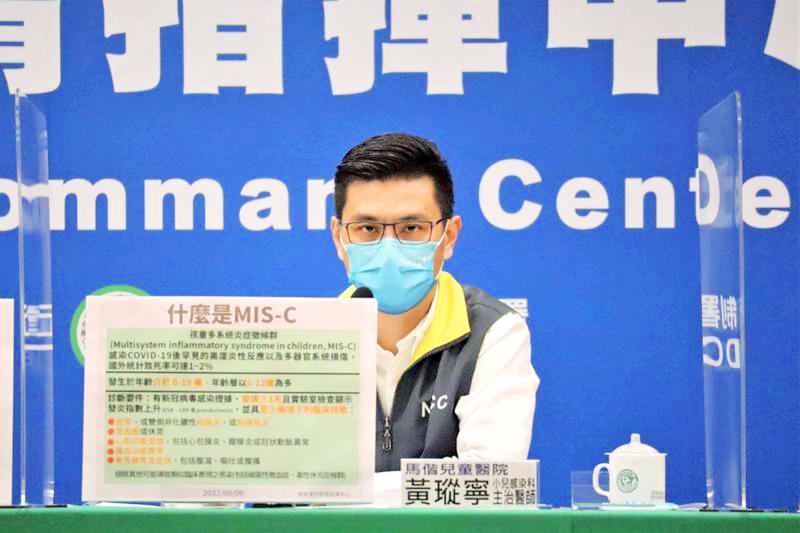The Central Epidemic Command Center (CECC) yesterday urged parents to look out for signs of multisystem inflammatory syndrome in children (MIS-C) in the six weeks following a COVID-19 infection.
A pediatrician at National Taiwan University Hospital on Sunday reported a case of MIS-C in a 10-year-old boy, who was diagnosed with COVID-19 in late April. The boy had mild symptoms which cleared up after a few days, but he later developed a high fever, diarrhea, rashes and other symptoms between May 28 and Tuesday last week. The boy was admitted to an intensive care unit for emergency treatment on Wednesday last week and was discharged from the unit on Sunday.
As this was the first case of MIS-C after COVID-19 infection to be reported in Taiwan, the CECC yesterday invited Huang Tsung-ning (黃瑽寧), an attending physician at Mackay Memorial Hospital’s pediatric infection department, to speak about the signs of possible MIS-C or other severe illnesses in children.

Photo courtesy of the Central Epidemic Command Center
Huang said MIS-C is an inflammatory reaction that occurs about two to six weeks after acute COVID-19 illness and that the inflammation can affect multiple organs, with a fatality rate of about 1 to 2 percent, according to overseas studies.
He said studies have suggested the incidence of MIS-C in Asians is much lower than among other ethnicities, and the incidence from infection by the Omicron variant of SARS-CoV-2 is also lower than previous variants, so a rough estimation is that the risk of MIS-C in infected children could be about 1 per 10,000 people at most.
One study has shown that getting a COVID-19 vaccine can reduce the risk of MIS-C by 97 percent, and none of the children in the study who received two vaccine doses developed MIS-C, he said, adding that since Taiwan has a high vaccination rate among children, local incidence could be even lower.
However, he said parents whose child has been infected with COVID-19 in the past six weeks should pay special attention to signs of MIS-C and seek immediate medical attention if they appear.
If the child has a fever lasting three or more days as well as one of the following symptoms — abdominal pain, diarrhea, vomiting, skin rash, red eyes or dizziness — within six weeks of testing positive for COVID-19, parents should take the child to a doctor immediately, he said.
He suggested that parents of children with COVID-19 who are under home care prepare medicine to reduce fever, as many children run a fever in the first two days.
Parents are also encouraged to discuss with a pediatrician whether their child should take drugs to help relieve symptoms, and avoid taking antibiotics or over-the-counter drugs, he said, adding that they should make sure their child gets plenty of water to prevent dehydration.
Meanwhile, Centers for Disease Control (CDC) Deputy Director-General Chuang Jen-hsiang (莊人祥), the CECC’s spokesman, said yesterday that 1,212 people have been diagnosed with COVID-19 twice since the pandemic began, but there is no clear consensus from studies on the severity of symptoms from a second infection.
CDC Deputy Director-General Philip Lo (羅一鈞), deputy head of the CECC’s medical response division, on Sunday said that while the COVID-19 reporting system automatically counts a second report of infection in the same person within three months as a single infection, doctors can change the report to a “reinfection” if they strongly suspect it to be the case.
Although the risk of contracting COVID-19 twice in a short period is very low, the center cannot exclude the possibility, so it is discussing the isolation procedures for reinfection, which could include allowing people to be released earlier after a comprehensive assessment to avoid imposing unnecessary restrictions on personal freedom, he said.

MORE VISITORS: The Tourism Administration said that it is seeing positive prospects in its efforts to expand the tourism market in North America and Europe Taiwan has been ranked as the cheapest place in the world to travel to this year, based on a list recommended by NerdWallet. The San Francisco-based personal finance company said that Taiwan topped the list of 16 nations it chose for budget travelers because US tourists do not need visas and travelers can easily have a good meal for less than US$10. A bus ride in Taipei costs just under US$0.50, while subway rides start at US$0.60, the firm said, adding that public transportation in Taiwan is easy to navigate. The firm also called Taiwan a “food lover’s paradise,” citing inexpensive breakfast stalls

US PUBLICATION: The results indicated a change in attitude after a 2023 survey showed 55 percent supported full-scale war to achieve unification, the report said More than half of Chinese were against the use of force to unify with Taiwan under any circumstances, a survey conducted by the Atlanta, Georgia-based Carter Center and Emory University found. The survey results, which were released on Wednesday in a report titled “Sovereignty, Security, & US-China Relations: Chinese Public Opinion,” showed that 55.1 percent of respondents agreed or somewhat agreed that “the Taiwan problem should not be resolved using force under any circumstances,” while 24.5 percent “strongly” or “somewhat” disagreed with the statement. The results indicated a change in attitude after a survey published in “Assessing Public Support for (Non)Peaceful Unification

The CIA has a message for Chinese government officials worried about their place in Chinese President Xi Jinping’s (習近平) government: Come work with us. The agency released two Mandarin-language videos on social media on Thursday inviting disgruntled officials to contact the CIA. The recruitment videos posted on YouTube and X racked up more than 5 million views combined in their first day. The outreach comes as CIA Director John Ratcliffe has vowed to boost the agency’s use of intelligence from human sources and its focus on China, which has recently targeted US officials with its own espionage operations. The videos are “aimed at

Four former Hong Kong opposition lawmakers jailed in the territory’s largest national security case were released yesterday after more than four years in prison, the first among dozens convicted last year to regain their freedom. Former legislators Claudia Mo (毛孟靜), Jeremy Tam (譚文豪), Kwok Ka-ki (郭家麒) and Gary Fan (范國威) were part of a group of 47 public figures — including some of Hong Kong’s best-known democracy advocates — who were charged with subversion in 2021 for holding an informal primary election. The case fell under a National Security Law imposed on the territory by Beijng, and drew international condemnation and warnings